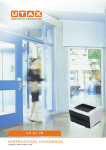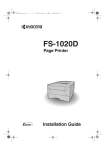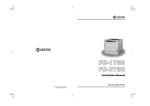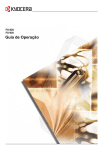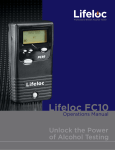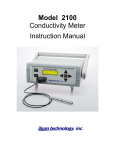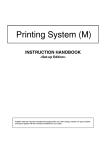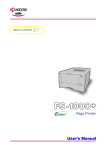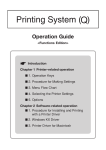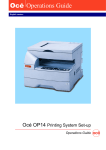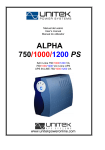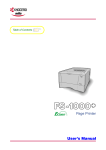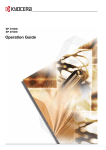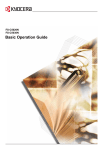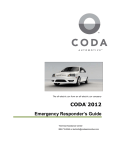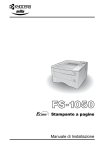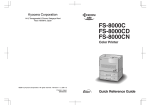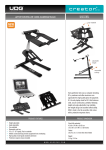Download Installation Manual - KYOCERA Document Solutions America
Transcript
Page Printer
Installation Manual
Ifs10ep-jp.book Page 1 Friday, December 22, 2000 4:27 PM
Caution
NO LIABILITY IS ASSUMED FOR ANY DAMAGE CAUSED BY IMPROPER INSTALLATION.
Notice on Software
SOFTWARE USED WITH THIS PRINTER MUST SUPPORT THE PRINTER'S EMULATION
MODE. The printer is factory-set to emulate the HP PCL 6. The emulation mode can be changed by
following the procedures described in the User's Manual contained as an electronic file in the
Kyocera Mita Digital Library CD-ROM supplied with the printer.
Notice
The information in this manual is subject to change without notification. Additional pages may be
inserted in future editions. The user is asked to excuse any technical inaccuracies or typographical
errors in the present edition.
No responsibility is assumed if accidents occur while the user is following the instructions in this
manual. No responsibility is assumed for defects in the printer's firmware (contents of its read-only
memory).
This manual, any copyrightable subject matter sold or provided with or in connection with the sale
of the page printer, are protected by copyright. All rights are reserved. Copying or other reproduction of all or part of this manual, any copyrightable subject matter without the prior written consent
of Kyocera Corporation is prohibited. Any copies made of all or part of this manual, any copyrightable subject must contain the same copyright notice as the material from which the copying is done.
Table of Contents
STEP1 Unpacking.........................................................................1
STEP2 Positioning the Printer .....................................................2
STEP3 Installing the Toner Container .........................................3
STEP4 Connecting the Printer to the Computer.........................6
STEP5 Connecting the Power Cord ............................................8
STEP6 Adding Paper to the Paper Cassette and MP Tray .........9
STEP7 Using the Face-Up Output Tray .....................................14
STEP8 Printing a Status Page....................................................15
©2000 by Kyocera Corporation. All rights reserved, Revision 1.0., December 2000
Ifs10ep-jp.book Page 1 Friday, December 22, 2000 4:27 PM
STEP
1
Unpacking
Carefully remove the printer and other items from the box. Check that nothing is missing against the list of shipped components below.
Shipped Components
Printer
Toner Container (TK-17)
Power Cord
Cleaning Cloth
Installation Manual (this booklet)
Kyocera Mita Digital Library CD-ROM
Removing Shipping Material
Remove the tape on the rear side of the printer, and remove the two spacers and
printed notice from the paper cassette.
Tape
Spacers
Printed Notice
☞
Go to next page
1
Ifs10ep-jp.book Page 2 Friday, December 22, 2000 4:27 PM
STEP
2
Positioning the Printer
Make sure that the place of installation meets the following requirements:
Clearance
30 cm (11-13/16 inches)
25 cm (9-7/8
inches)
50 cm
(19-11/16
inches)
40 cm
(15-3/4
inches)
Be sure to secure enough space
around the printer. Prolonged
use without sufficient clearance
may cause heat to build up
within the printer, resulting in
fire.
25 cm
(9-7/8
inches)
Environment
Temperature
Humidity
10 to 32.5 °C (50 to 90.5 °F), ideally about 23 °C (73.4 °F)
20 to 80 %, ideally 60 %
Do not install the printer where temperature or humidity is outside the recommended range. Print quality may suffer and there will be an increased
chance of paper jams.
Places to Avoid
Avoid installing the printer in locations subject to:
•
•
•
•
•
•
•
•
Direct drafts of hot or cold air
Direct drafts from outside (Avoid locations near building entrances.)
Sudden temperature or humidity changes
Sources of high temperature, for example, near stoves or radiators
Excessive dust
Vibration
Unstable surfaces and surfaces that are not level
Ammonia or other harmful fumes (If you are planning to fumigate the room, or
make liberal use of insecticide, remove the printer first!)
• Excessive sunlight or humidity
• Lack of ventilation
• Low air pressure, e.g., elevations greater than 2000 meters (6500 feet) above sea
level
2
Ifs10ep-jp.book Page 3 Friday, December 22, 2000 4:27 PM
STEP
3
Installing the Toner Container
Before you can use the printer for the first time, you must set up the printer by installing
the toner container and interfacing with the computer.
1 Open the printer top cover all the way.
2 Confirm that the lock lever is in the
release (UNLOCK) position. If not, pull it
forward until it is in the release position.
3 Take the toner container from the bag.
Hold it with the protective seal (orangecolored) facing up. Shake the toner container horizontally at least 5 times. This
ensures that the toner is evenly distributed inside.
☞
Go to next page
3
Ifs10ep-jp.book Page 4 Friday, December 22, 2000 4:27 PM
4 Carefully remove the protective seal.
5 Install the toner container into the
printer.
6 Push firmly on the top of the toner container at the positions marked PUSH
HERE.
4
Ifs10ep-jp.book Page 5 Friday, December 22, 2000 4:27 PM
LOCK
7 Push the lock lever to the lock (LOCK)
UNLOCK
LOCK
UNLOCK
position.
8 Close the top cover.
When the printer is first
switched on after toner installation, there will be a delay of
approximately 15 minutes
before the printer gets ready to
print.
To remove the toner container
Lock Lever #2
Pull the lock lever #1 to the release
(UNLOCK) position, pull the lock lever
#2, then gently remove the toner container.
Lock Lever #1
☞
Go to next page
5
Ifs10ep-jp.book Page 6 Friday, December 22, 2000 4:27 PM
STEP
4
Connecting the Printer to the Computer
There are various ways of connecting the printer to the computer, such as through the
parallel interface connector or through the optional network interface board.
Printer Connections
Network
Optional Serial Interface
Board kit (IB-10E)
Optional Network
Interface Board
(DC 3.3V)
Serial Interface
Parallel Interface
Printer (Rear)
Power Supply
Before performing this step, be sure to turn off both the printer and the computer’s power switches and unplug the printer’s power plug from the power
outlet. Failure to do so may result in electrical shock.
A standard Centronics parallel interface connector (
the printer.
6
) is located on the rear of
Ifs10ep-jp.book Page 7 Friday, December 22, 2000 4:27 PM
Parallel Interface Connection
1 Plug one end of the printer cable (not
included) into the parallel interface connector on the rear of the printer.
Clips
• Use a parallel printer cable
that complies with the
IEEE1284 standards.
• The printer will work best if it
is installed near the computer.
The connecting cable should
be shielded and not be longer
than 3 meters (10 feet).
To printer
Printer Cable
2 Close the clips on both sides to fix the
connector in place.
Plug the other end of the printer cable
into the computer’s Centronics parallel
interface connector.
☞
Go to next page
7
Ifs10ep-jp.book Page 8 Friday, December 22, 2000 4:27 PM
STEP
5
Connecting the Power Cord
This section describes the procedure for connecting the power cable and various
cautions.
Notes on Power Supply
• Install the printer near an AC wall outlet, preferably one that can be used for
the printer alone.
• Only use this printer with the supply voltage indicated on the serial number
label attached to the printer’s rear panel.
• If an extension cord is used, the total length of the power cord plus extension
should be 5 meters (17 feet) or less.
Power Requirements
120 V (U.S.A. and Canada), 220 to 240 V (European countries, and the
Asia-Pacific region), ±10 % at each voltage
Voltage
60 Hz (120 V) ±2 %, 50/60 Hz (220 to 240 V) ±2 %
Frequency
Current capacity
Max. 4.4 A at 120 V, or max. 2.2 A at 230 V
To Connect the Power Cord
• Be sure the printer’s power switch is turned off.
• Only use the power cord supplied with the printer.
Power Cord
Connector
1 Plug the power cord into the power cord
connector on the rear of the printer.
Power Cord
2 Connect the other end of the power cord
into a power outlet.
Be sure to connect to a 3-wire
grounded power strip.
8
Ifs10ep-jp.book Page 9 Friday, December 22, 2000 4:27 PM
STEP
6
Adding Paper to the Paper Cassette and MP
Tray
The paper cassette can accommodate A5 to Legal size paper and can hold approximately 250 sheets. The Multi-Purpose tray can accommodate the various paper sizes
and can hold approximately 50 sheets of paper.
The following paper weights can be used with the printer.
Paper source
Paper weight
Paper cassette
60 to 105 g/m²
MP tray
60 to 163 g/m²
The edges of paper are sharp. When loading paper, be careful not to cut
your hand on the paper.
Paper cassette
Standard paper sizes are attached to the inside of the paper cassette as shown in
the following figure. Align the paper guides and paper stopper to the paper size
you want to print on as described on the next page.
☞
Go to next page
9
Ifs10ep-jp.book Page 10 Friday, December 22, 2000 4:27 PM
1 Pull the paper cassette all the way out of
the printer.
2 Adjust the position of the paper stopper
located at the rear of the paper cassette.
Press in the release button and slide the
stopper to the desired paper size. When
shipped from the factory, the paper cassette is set to either A4 or Letter size.
Release Button
Paper Stopper
3 Adjust the position of the paper guides
Paper Guide
Release Button
located on the left and right sides of the
paper cassette. Press in the release button on the left side guide and slide to the
desired paper size.
When using custom size paper, move the
paper guides and paper stopper all the
way out, insert the paper, then adjust
the paper guides and paper stopper to
the size of the paper. Adjust them so that
they are in light contact with the paper.
The printer does not automatically detect the size of the paper
loaded into the paper cassette
or MP tray. As a result, whenever you load paper having a
different size, you must reset
the paper size setting using the
Remote Operation Panel utility.
For details, refer to the User's
Manual contained as an electronic file in the CD-ROM supplied with the printer.
10
Ifs10ep-jp.book Page 11 Friday, December 22, 2000 4:27 PM
4 Make sure that the edges of the paper
are aligned. Slide the paper into the
paper cassette.
Load Limit
Do not load more paper than will
fit under the load limits on the
top of the paper guides. (the
paper cassette will hold approximately 250 sheets of paper with
a 80 g/m² (21 lb.) basis weight,
or with a thickness of 110
microns.)
5 Insert the paper cassette into the slot in
the printer. Push it straight in as far as
it will go.
☞
Go to next page
11
Ifs10ep-jp.book Page 12 Friday, December 22, 2000 4:27 PM
Multi-Purpose (MP) tray
1 Pull the MP tray towards you until it
stops.
2 Pull out the subtray and unfold the flap.
Subtray
Flap
3 Adjust the position of the paper guides
on the MP tray. Standard paper sizes
are attached to the MP tray. For standard paper sizes, slide the guides to the
position marked correspondingly.
• Do not load more paper than
will fit under the load limits on
the inside of the MP tray.
• If the paper is considerably
curled in one direction, for
example, if the paper is
already printed on one side,
try to roll the paper in the
opposite direction to counteract the curl. Printed sheets
will then come out flat.
Correct
Incorrect
12
Ifs10ep-jp.book Page 13 Friday, December 22, 2000 4:27 PM
Envelopes
Envelopes should be fed in the face-up position, right edge first.
• Test a sample envelope on the printer and check that printing quality is
satisfactory before purchasing.
• To avoid trouble, we recommend that envelopes be delivered face-up
using the face-up tray. Refer to Step 7.
Some types of envelopes are not suitable
for printing. For details on suitable
types of envelopes, see the User's Manual contained as an electronic file in the
CD-ROM supplied with the printer.
To close the MP tray
Close the flap on the subtray, then push in the subtray and close the MP tray.
Be careful not to push the tray
back into the printer with the
subtray folded out horizontally
as shown in the figure.
No
☞
Go to next page
13
Ifs10ep-jp.book Page 14 Friday, December 22, 2000 4:27 PM
STEP
7
Using the Face-Up Output Tray
Use the face-up output tray when you wish paper to be stacked with the printed side
facing up (reverse order), or when you are printing on envelopes, postcards, transparencies, or thick paper.
1 Pull on the face-up output tray to open
it.
2 Open the extension tray by pressing
with your thumbs at the corners next to
the hinges.
14
Ifs10ep-jp.book Page 15 Friday, December 22, 2000 4:27 PM
STEP
8
Printing a Status Page
To test the printer, print a status page indicating factory settings.
1 Turn on the printer’s power switch.
Upon turning on the power, the printer’s
4 indicators flash in sequence until
printer initialization is complete, then
the indicator ( [on line]) lights
steadily.
If the indicator does not light,
check that previous steps were
performed properly.
If you install the toner container and
turn on the power, after a moment the
indicators light in sequence from top to
bottom. When the printer is first
switched on after toner installation, there will be a delay of approximately 15 minutes before the
printer gets ready to print. Once the
indicator lights, printer installation
is complete.
2 The printer can print two different
types of status page — standard and
service-purpose. A service-purpose status page contains more detailed information about printer settings than a
standard status page.
• To print a standard status page, press
the
key for at least 3 seconds and
the indicators light in sequence from
top to bottom.
• To print a service-purpose status
page, press the
key for more than
10 seconds and the indicators light in
sequence twice from top to bottom.
If the status page prints correctly,
printer setup is complete. For details on
using the printer, refer to the User's
Manual contained as an electronic file
in the CD-ROM supplied with the
printer.
☞
Go to next page
15
Ifs10ep-jp.book Page 16 Friday, December 22, 2000 4:27 PM
Correcting a Paper Jam
If a paper jam occurs while you are printing, remove the jammed paper as
described below. After you have removed the jammed paper, open and close the top
cover once.
Jam at the Face-down and Face-up Trays
Open the face-up tray and remove the
jammed paper as shown in the figure.
Face-up Tray
Jam at the Paper Cassette
Pull out the paper cassette and remove
the jammed paper.
Paper Cassette
Jam Inside the Printer
Top Cover
16
1 Open the printer's top cover.
Ifs10ep-jp.book Page 17 Friday, December 22, 2000 4:27 PM
2 Open the printer's front cover.
Front Cover
3 Lift the process unit together with the
toner container out of the printer.
Process Unit
4 Remove the jammed paper.
When pulling the paper, pull
gently so as not to tear it. Torn
pieces of paper are difficult to
remove and may be easily overlooked, preventing recovery
from the jam.
5 Replace the process unit and toner container, then close the printer.
☞
Go to next page
17
Ifs10ep-jp.book Page 18 Friday, December 22, 2000 4:27 PM
FCC statement (for users in the United States)
This device complies with Part 15 of the FCC Rules. Operation is subject to the following two conditions: (1) This device may not cause harmful interference, and (2) this device must accept any
interference received, including interference that may cause undesired operation.
■ Note
This equipment has been tested and found to comply with the limits for a Class B digital device,
pursuant to Part 15 of the FCC Rules. These limits are designed to provide reasonable protection
against harmful interference in a residential installation. This equipment generates, uses, and can
radiate radio frequency energy and, if not installed and used in accordance with the instructions,
may cause harmful interference to radio communications. However, there is no guarantee that
interference will not occur in a particular installation. If this equipment does cause harmful interference to radio or television reception, which can be determined by turning the equipment off and
on, the user is encouraged to try to correct the interference by one or more of the following measures:
• Reorient or relocate the receiving antenna.
• Increase the separation between the equipment and receiver.
• Connect the equipment into an outlet on a circuit different from that to which the receiver is connected.
• Consult the dealer or an experienced radio/TV technician for help.
Changes or modifications not expressly approved by the manufacturer for compliance could void the
user's authority to operate the equipment. Shielded circular cable should be used for interfacing
with the computer.
■ Caution to user
Any modification without prior permission may cause harmful interference.
If any modification/change is introduced to this equipment without prior permission, Kyocera Mita
as the manufacturer cannot guarantee compliance with FCC rules. To use equipment which does
not comply with FCC rules is prohibited. The printer may be optionally installed with the following
units:
■ Options Conforming to the Class B limits
• PK-6 KPDL 2 Upgrade Kit
• IB-10E Serial Interface Board Kit
• PF-17 Paper Feeder (250 sheets)
Important note on the interface connectors
Be sure to turn off printer power before connecting or disconnecting an interface cable to the printer.
For protection against static discharge which may be applied to the printer's internal electronics
through the interface connector(s), keep any interface connector which is not in use capped using
the protective cap supplied.
Note: Use shielded interface cable.
Safety information
■ Laser safety
This printer is certified as a Class 1 laser product under the U.S. Department of Health and Human
Services (DHHS) Radiation Performance Standard according to Radiation Control for Health and
Safety Act of 1968. This means that the printer does not produce hazardous laser radiation. Since
radiation emitted inside the printer is completely confined within protective housings and external
covers, the laser beam cannot escape from the printer during any phase of user operation.
■ Laser notice
This printer is certified in the U.S. to conform to the requirements of DHHS 21 CFR Subchapter for
Class I (1) laser products, and elsewhere is certified as a Class I laser product conforming to the
requirements of IEC 825.
18
Ifs10ep-jp.book Page 19 Friday, December 22, 2000 4:27 PM
DANGER: INVISIBLE LASER RADIATION WHEN OPEN. AVOID DIRECT EXPOSURE TO BEAM.
CAUTION: Use of controls or adjustments or performance of procedures other than those specified
herein may result in hazardous radiation exposure.
■ Caution labels
Label inside the printer (Laser radiation warning)
(European/Asian/Pacific countries)
(U.S.A./Canada)
Label on the printer's rear panel
Label inside the rear
CDRH regulations
The Center of Devices and Radiological Health (CDRH) of the U.S. Food and Drug Administration
implemented regulations for laser products on August 2, 1976. These regulations apply to laser
products manufactured after August 1, 1976. Compliance is mandatory for products marketed in
the United States. A label indicating compliance with the CDRH regulations must be attached to
laser products marketed in the United States.
Ozone concentration
The printers generate ozone gas (O3) which may concentrate in the place of installation and cause
an unpleasant smell. To minimize concentration of ozone gas to less than 0.1 ppm, we recommend
you not to install the printer in a confined area where ventilation is blocked.
☞
Go to next page
19
Ifs10ep-jp.book Page 20 Friday, December 22, 2000 4:27 PM
IMPORTANT SAFEGUARDS
1.
2.
3.
4.
Read all of these instructions and save these instructions for later use.
Unplug this product from the wall outlet before cleaning.
Do not use this product near water.
Do not place this product on an unstable cart, stand, or table. The product may fall, causing serious
damage to the product.
5. Slots and openings in the cabinet and the back are provided for ventilation to ensure reliable operation of the product and to protect it from overheating, these openings must not be blocked or covered. The openings should never be blocked by placing the product on a bed, sofa, rug, or other
similar surface. This product should never be placed near or over a radiator or heat register. This
product should not be placed in a built-in installation unless proper ventilation is provided.
6. This product is equipped with a 3-wire grounding type plug, a plug having a third (grounding) pin.
This plug will only fit into a grounding-type power outlet. This is a safety feature. If you are unable
to insert the plug into the outlet, contact your electrician to replace your obsolete outlet. Do not
defeat the purpose of the grounding-type plug.
7. Do not allow anything to rest on the power cord. Do not locate this product where persons will walk
on the cord.
8. If an extension cord is used with this product, make sure that the total of the ampere ratings on
the products plugged into the extension cord do not exceed the extension cord ampere rating.
9. Never push objects of any kind into this product through cabinet slots as they may touch dangerous
voltage points or short out parts that could result in a risk of fire or electric shock. Never spill liquid
of any kind on the product.
10. Except as explained elsewhere in User's Manual, do not attempt to service this product yourself.
Removing covers may expose you to dangerous voltage points or other risks. Refer all servicing in
those compartments to service personnel.
11. Unplug this product from the wall outlet and refer servicing to qualified service person-nel under
the following conditions:
A- When the power cord or plug is damaged or frayed.
B- If liquid has been spilled into the product.
C- If the product has been exposed to rain or water.
D- If the product does not operate normally when the operating instructions are followed.
Adjust only those controls that are covered by the operating instructions since improper
adjustment of other controls may result in damage and will often require extensive work by
a qualified technician to restore the product to normal operation.
E- If the product has been dropped or the cabinet has been damaged.
Canadian Department of Communications compliance statement
This Class B digital apparatus complies with Canadian ICES-003.
Avis de conformité aux normes du ministère des Communications du
Canada
Cet appareil numérique de la classe B est conforme à la norme NMB-003 du Canada.
ISO 7779
Maschinenlärminformationsverordnung 3. GSGV, 18.01.1991: Der höchste Schalldruckpegel
beträgt 70 dB(A) oder weniger gemäß ISO 7779.
20
Ifs10ep-jp.book Page 21 Friday, December 22, 2000 4:27 PM
CE Marking Directive
according to Council Directive 89/336/EEC and 73/23/EEC
Manufacturer's name:
Manufacturer's address:
Kyocera Corporation, Printer Division
2-14-9 Tamagawadai, Setagaya Ward, Tokyo 158-8610, Japan
declares that the product
Product name:
Model number:
Page Printer
FS-1000+ (as tested with the enhancement optional unit: PF-17 and IB-10E)
conforms to the following product specifications.
EN 55 022:1998 Class B
EN 61 000-3-2:1995
EN 61 000-3-3:1995
EN 55 024:1998
EN 60 950:1992 (+A1+A2+A3+A4+A11)
EN 60 825-1:1994+A11
The manufacturer and its merchandising companies retain the following technical documentation
in anticipation of the inspection that may be conducted by the authorities concerned.
User's instruction that conforms to the applicable specifications
Technical drawings
Descriptions of the procedures that guarantee the conformity
Other technical information
Kyocera Mita Deutschland
Mollsfeld 12
40670 Meerbusch, Germany
Phone:
+49 21 59 9180
Fax:
+49 21 59 918 100
Declaration of Conformity (Australia)
Manufacturer's name:
Manufacturer's address:
Kyocera Corporation, Printer Division
2-14-9 Tamagawadai, Setagaya Ward, Tokyo 158-8610, Japan
declares that the product
Product name:
Model number:
Page Printer
FS-1000+ (as tested with the enhancement optional unit: PF-17)
Description of device:
The model FS-1000+ is a 12-ppm, A4 size plain paper supporting page printer, utilizing laser, dry toner, etc.
The printer can be equipped with the optional paper feeder model PF-17.
Conforms to the following product specifications.
AS/NZS 3548: 1995 (EN 55 022:1998 Class B)
IEC 60950 (EN 60 950:1992+A1+A2+A3+A4+A11)
IEC 60825-1 (EN 60 825-1:1994+A11)
The manufacturer and its merchandising companies retain the following technical documentation
in anticipation of the inspection that may be conducted by the authorities concerned.
User's instruction that conforms to the applicable specifications
Technical drawings
Descriptions of the procedures that guarantee the conformity
Other technical information
Kyocera Mita Australia Pty., Ltd.
☞
Go to next page
21
Ifs10ep-jp.book Page 22 Friday, December 22, 2000 4:27 PM
6-10 Talavera Road, North Ryde, NSW 2113, Australia
Phone:
+61 2-9888-9999
Fax:
+61 2-9888-9588
Declaration of Conformity (U.S.A.)
Model Number:
Trade Name:
Responsible Party:
Address:
Telephone number:
Fax number:
Laser Printer FS-1000+ (as tested with enhancement optional units:
PF-17, IB-10E.)
Kyocera
Kyocera Mita America Inc.
225 Sand Road PO Box 40008 Fairfield, New Jersey 07004-0008, U.S.A.
(973) 808-8444
(973) 882-6000
Contact person for technical: Ryozo Kojima
Phone:
973-882-6019
Manufacturer’s name:
Kyocera Corporation, Printer Division
Manufacturer’s address: 2-14-9 Tamagawadai, Setagaya Ward, Tokyo 158-8610, Japan
This device complies with Part 15 of the FCC Rules, Operation is subject to the following two conditions: (1) This device may not cause harmful interference, and (2) this device must accept any
interference received, including interference that may cause undesired operation.
The manufacturer and its merchandising companies retain the following technical documentation
in anticipation of the inspection that may be conducted by the authorities concerned.
User’s instruction that conforms to the applicable specifications.
Technical drawings.
Descriptions of the procedures that guarantee the conformity.
Other technical information.
Kyocera Mita America Inc.
Disclaimer
We shall have no liability or responsibility to customers or any other person or entity with respect to any
liability, loss or damage caused or alleged to be caused directly or indirectly by equipment sold or furnished by us, including but not limited to, any interruption of service, loss of business or anticipatory
profits, or consequential damages resulting from the use or operation of the equipment or software.
Prolonged Non-Use and Moving the Printer
■ Prolonged Non-use
If you ever leave the printer unused for a long period of time, remove the power cord from the wall outlet.
We recommend you consult with your dealer about the additional actions you should take to avoid
possible damages that may occur when the printer is used next time.
■ Moving the Printer
When you move the printer:
• Move it gently.
• Keep it as level as possible, to avoid spilling toner
inside the printer as shown in the figure.
• If you ship the printer, remove and ship the process
unit separately. Pack the process unit in a plastic
bag and ship them separate from the printer itself.
Be sure to consult a serviceman before attempting
long-distance transportation of the printer.
22
Ifs10ep-jp.book Page 23 Friday, December 22, 2000 4:27 PM
ENERGY STAR®
As an ENERGY STAR Partner, Kyocera Mita Corporation has determined
that this product meets the ENERGY STAR guidelines for energy efficiency.
The basic objective of the ENERGY STAR Program is to reduce environmental pollution by encouraging the manufacture and sale of equipment that uses energy more efficiently.
This printer is equipped with a sleep timer function that conforms with
the standards of the ENERGY STAR Program. This function makes it
possible to reduce the amount of electrical power consumed by the
printer. For maximum power savings, turn off the printer's power supply when not using the printer for extended periods of time.
For details on the sleep timer function and printer power consumption,
refer to the CD-ROM instruction manual provided with the printer.
Initial settings of the sleep timer function and power saved using the
sleep timer function:
Initial sleep mode setting
Power consumption in sleep mode
5 minutes (15 minutes)
5 W (20 W)
( ): ENERGY STAR program guideline
The action program Energy 2000
Energy partnership for a sustainable development. We get further –
with all our energy.
☞
Go to next page
23
Ifs10ep-jp.book Page 24 Friday, December 22, 2000 4:27 PM
Options
The following options are available for the printer.
PF-17 Paper Feeder
PK-6 KPDL2 Upgrade Kit
IB-10E Serial Interface Board Kit
Network Boards
See your Kyocera Mita dealer for purchasing information of the network board that is best suited
for use with this printer.
Use only the network board operating from DC 3.3V.
24
Ifs10ep-jp.book Page 25 Friday, December 22, 2000 4:27 PM
Regarding Tradenames
PRESCRIBE is a registered trademark of Kyocera Corporation. PRESCRIBE 2e, KPDL, and KIR
(Kyocera Image Refinement) are trademarks of Kyocera Corporation.
Hewlett-Packard, PCL, and PJL are registered trademarks of Hewlett-Packard Company. Centronics is a trade name of Centronics Data Computer Corp. PostScript is a registered trademark of
Adobe Systems Incorporated. Adobe and Acrobat are trademarks of Adobe Systems Incorporated.
ENERGY STAR is a U.S. registered mark.
This Kyocera Mita page printer uses PeerlessPrintXL to provide the HP LaserJet compatible PCL6
language emulation. PeerlessPrintXL is a trademark of The Peerless Group, Redondo Beach, CA
90278, U.S.A.
This product was developed using the Tornado™ Real Time Operating System and Tools from Wind
River Systems.
This product contains UFST™ and MicroType® fonts from Agfa Corporation.
IBM PROGRAM LICENSE AGREEMENT
THE DEVICE YOU HAVE PURCHASED CONTAINS ONE OR MORE SOFTWARE PROGRAMS
("PROGRAMS") WHICH BELONG TO INTERNATIONAL BUSINESS MACHINES CORPORATION ("IBM"). THIS DOCUMENT DEFINES THE TERMS AND CONDITIONS UNDER WHICH
THE SOFTWARE IS BEING LICENSED TO YOU BY IBM. IF YOU DO NOT AGREE WITH THE
TERMS AND CONDITIONS OF THIS LICENSE, THEN WITHIN 14 DAYS AFTER YOUR
ACQUISITION OF THE DEVICE YOU MAY RETURN THE DEVICE FOR A FULL REFUND. IF
YOU DO NOT SO RETURN THE DEVICE WITHIN THE 14 DAYS, THEN YOU WILL BE
ASSUMED TO HAVE AGREED TO THESE TERMS AND CONDITIONS.
The Programs are licensed not sold. IBM, or the applicable IBM country organization, grants you a
license for the Programs only in the country where you acquired the Programs. You obtain no rights
other than those granted you under this license.
The term "Programs" means the original and all whole or partial copies of it, including modified copies or portions merged into other programs. IBM retains title to the Programs. IBM owns, or has
licensed from the owner, copyrights in the Programs.
1. License
Under this license, you may use the Programs only with the device on which they are installed and
transfer possession of the Programs and the device to another party.
If you transfer the Programs, you must transfer a copy of this license and any other documentation
to the other party. Your license is then terminated. The other party agrees to these terms and conditions by its first use of the Program.
You may not:
1) use, copy, modify, merge, or transfer copies of the Program except as provided in this license;
2) reverse assemble or reverse compile the Program; or
3) sublicense, rent, lease, or assign the Program.
2. Limited Warranty
The Programs are provided "AS IS."
THERE ARE NO OTHER WARRANTIES COVERING THE PROGRAMS (OR CONDITIONS),
EXPRESS OR IMPLIED, INCLUDING, BUT NOT LIMITED TO, THE IMPLIED WARRANTIES
OF MERCHANTABILITY AND FITNESS FOR A PARTICULAR PURPOSE.
Some jurisdictions do not allow the exclusion of implied warranties, so the above exclusion may not
apply to you.
SUPPLEMENT TO AGREEMENT FOR SOFTWARE BUNDLING AND DISTRIBUTION FOR
ALDC
☞
Go to next page
25
Ifs10ep-jp.book Page 26 Friday, December 22, 2000 4:27 PM
3. Limitation of Remedies
IBM's entire liability under this license is the following;
1) For any claim (including fundamental breach), in any form, related in any way to this license,
IBM's liability will be for actual damages only and will be limited to the greater of:
a) the equivalent of U.S.$25,000 in your local currency; or
b) IBM's then generally available license fee for the Program
This limitation will not apply to claims for bodily injury or damages to real or tangible personal
property for which IBM is legally liable.
IBM will not be liable for any lost profits, lost savings, or any incidental damages or other economic
consequential damages, even if IBM, or its authorized supplier, has been advised of the possibility
of such damages. IBM will not be liable for any damages claimed by you based on any third party
claim. This limitation of remedies also applies to any developer of Programs supplied to IBM. IBM's
and the developer's limitations of remedies are not cumulative. Such developer is an intended beneficiary of this Section. Some jurisdictions do not allow these limitations or exclusions, so they may
not apply to you.
4. General
You may terminate your license at any time. IBM may terminate your license if you fail to comply
with the terms and conditions of this license. In either event, you must destroy all your copies of the
Program. You are responsible for payment of any taxes, including personal property taxes, resulting
from this license. Neither party may bring an action, regardless of form, more than two years after
the cause of action arose. If you acquired the Program in the United States, this license is governed
by the laws of the State of New York. If you acquired the Program in Canada, this license is governed
by the laws of the Province of Ontario. Otherwise, this license is governed by the laws of the country
in which you acquired the Program.
26
Ifs10ep.book Page 26 Tuesday, December 19, 2000 9:09 PM
This page intentionally left blank.
Ifs10ep.book Page 26 Tuesday, December 19, 2000 9:09 PM
This page intentionally left blank.
Ifs10ep-jp.book Page 27 Friday, December 22, 2000 4:27 PM
Operating Keys and Indicators
For details on operating procedures, see the FS-1000+ User's Manual contained as an electronic file in the CD-ROM supplied with the printer.
1
2
3
4
Number
2
Data indicator
Indicates that the printer is receiving data.
5
3
Paper Empty/
Paper Jam indicator
Indicates whether the paper cassette is
empty or a paper jam has occurred.
4
Toner indicator
Indicates when toner is low, or when toner
is exhausted.
5
(Cancel key)
Abandons a printing job.
6
(Go key)
• Switches the printer on-line and off-line.
• When pressed for 3 or more seconds,
prints a user status page.
• Selects the MP tray feed or paper cassette feed when the paper runs out.
• Prints and feeds out one page.
1
Name
6
Operator Panel
Function
On line indicator
Indicates whether the printer is on-line or
off-line.
Remote Operation Panel
The Remote Operation Panel is a utility that allows you to make basic printer settings from
the computer connected to the printer or the network. For details on installation and usage,
see the FS-1000+ User's Manual contained as an electronic file in the CD-ROM supplied
with the printer.
5
6
1
7
2
3
4
Remote Operation Panel
Number
Name
Function
1
Message display
Indicates printer status, the active interface, the resolution, the paper size of the current paper cassette, the number of copies to be printed, and error messages.
2
SETUP button
Makes basic settings for the Remote Operation Panel utility.
3
CONNECT button
Selects the type of connection between the printer and the computer — either local (via
serial or parallel interface) or network.
4
HELP button
Displays help messages.
5
GO button
Performs the same function as the printer's
is connected to a computer via the network.
6
MENU button
Displays various printer settings and confirmation items.
7
Monitor window
Simulates the printer's status using virtual printer animation. For example, when you
open the printer's top cover, the top cover on the printer image also open.
key. Displayed only when the printer
Printed in Japan/Imprimé au Japon
5KKTA88E++AX 1200PS/SG































